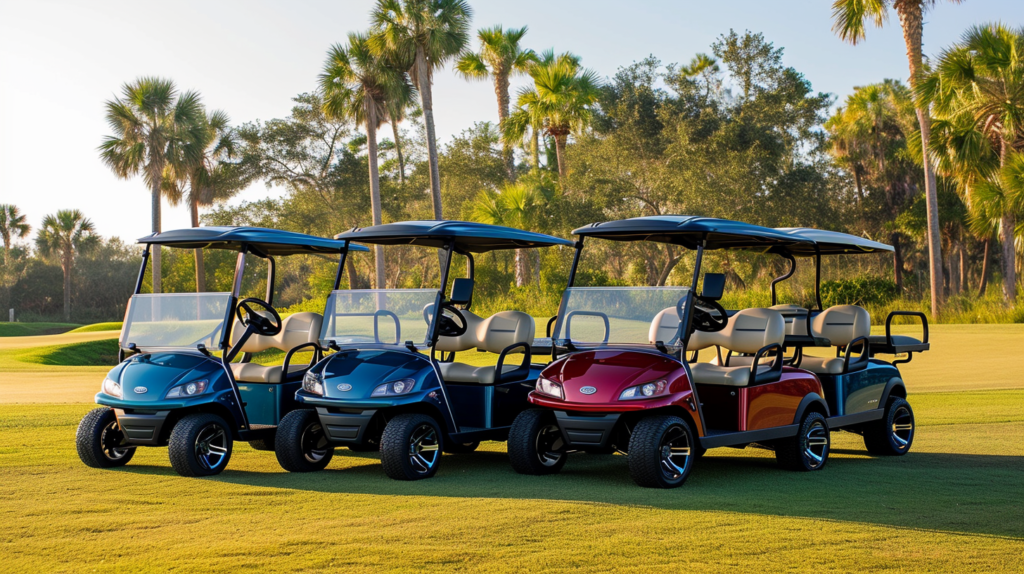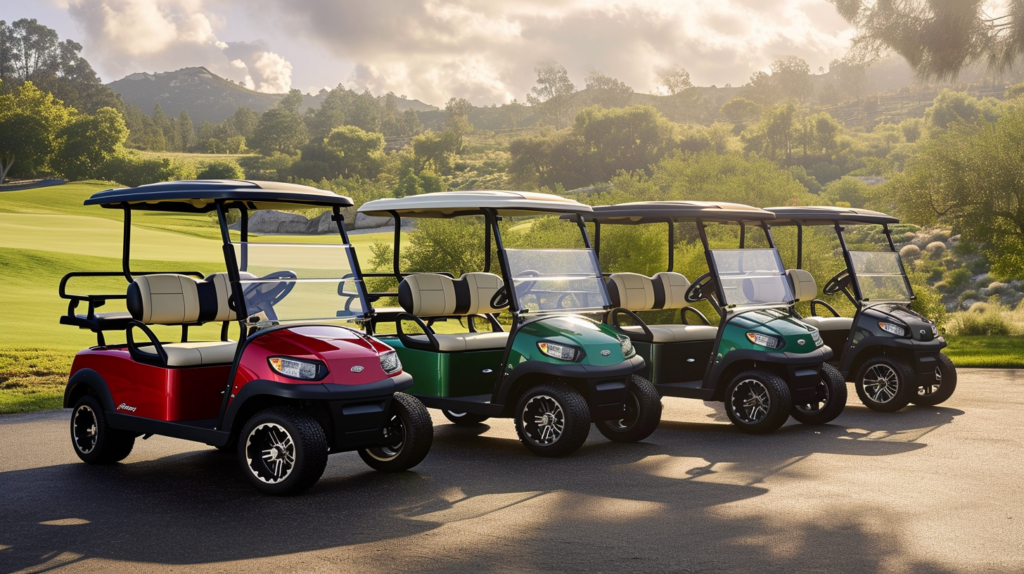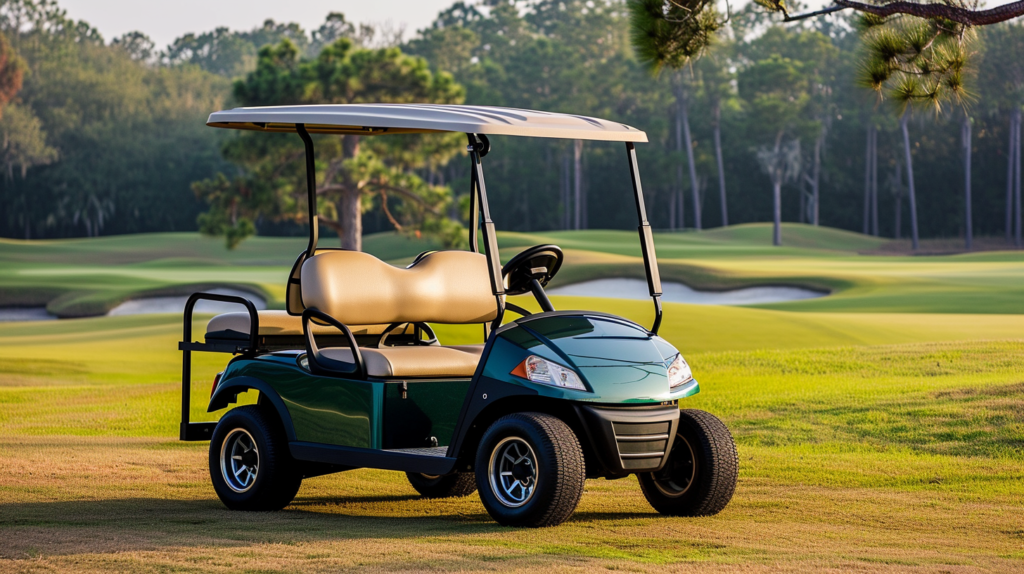With models ranging from just $2,000 to over $20,000, you may be wondering “how much is a golf cart really supposed to cost?”
Properly pricing golf carts depends on several key factors.
Let’s dive in to better understand golf cart value considerations across new, ushow much is a golf carted and certified pre-owned inventory segments…
How Much Is A Golf Cart

Golf cart pricing ranges widely from around $2,000 for basic used models purchased privately up to $20,000 and beyond for new luxury, custom edition carts from premium brands loaded with features and upgrades.
Factors That Influence Golf Cart Pricing

There are several important considerations that determine what an individual golf cart will be priced at.
Assessing aspects like whether the cart is purchased firsthand from a dealer or pre-owned from a private party, comparing gas-powered engines to electric motors, understanding reputable brand names that command higher pricing.
Evaluating what special features or upgrades are included, and researching multiple buying options in terms of classified listings, auction events, online retailers, and brick-and-mortar stores all contribute to understanding overall pricing ranges and value comparisons.
By becoming educated on these influencing factors that impact costs, buyers can make fully informed financial decisions on golf cart purchases while better setting realistic budgets that account for expenses beyond just the upfront sale price.
Carefully weighing benefits and tradeoffs of used pricing versus new, gas versus electric, basic models versus loaded configurations, and buying from mass merchandisers versus specialty dealers allows tailoring choices best aligned with transportation requirements.
And how the vehicle will actually be utilized whether at a private country club or for neighborhood personal errands for example.
New Versus Used Golf Carts
A major differentiating variable with significant impact on golf cart valuation and affordability considerations is whether the cart is an untouched new model being sold for the very first time or a pre-owned variant that has already gone through previous ownership and handling.
Brand new carts that have zero wear and tear unconditionally command premium pricing given their peak factory condition along with included manufacturer warrantees on components that used counterparts lack.
However, gently operated carts from private parties and off-lease returns can offer tremendous value, especially once diligent mechanical and cosmetic inspections are performed to assess state of batteries, tires, controls, upholstery, electrical systems, etc.
Those willing to research reputable refurbishment dealers can find even higher grade reconditioned carts with new batteries, powder coated frames, upgraded wheels and more that rival new quality for thousands less.
Ultimately tallying up front-end savings against any reconditioning investments needed is required to determine ideal new versus used purchase decisions.
New provides predictability and peace of mind while used opens up wider diversity of brands and configurations at friendlier budget pricing for those not requiring absolute latest model year offerings.
Gas Power Versus Electric Golf Carts
In a similar vein, deciding between internal combustion gas engines versus electric motors powered by large battery packs also sway cart valuations noticeably.
Gas variants through longstanding manufacturers like Club Car offer upfront affordability around baseline mobility needs but require ongoing fuel costs that add up over years depending on frequency of use.
Electric configurations are priced at a premium for their silent operations and eco-friendly aspects but pay dividends through lower lifetime operating costs.
Determining realistic range requirements and charging access opportunities are necessary to right-size battery capacity needs.
Those regularly driving longer distances with minimal downtime between trips may need to rule out electric options that a short-range retiree would be perfectly content with.
Again, compromises exist between gas and electric engines so clearly identifying intended purposes allows properly aligning the two energy sources to specific consumer needs.
Gas suits buyers on tighter budgets while electric appeals to those emphasized reduced emissions and lower lifetime costs. Understanding differences in mechanical complexity is also worthwhile, especially if users plan to handle basic troubleshooting themselves.
Brand And Manufacturer Reputation With Golf Carts
The company engineering and building golf carts has significant impact on pricing as well, which holds true for most industries.
Industry titans like Club Car, who first pioneered the widespread adoption of golf carts in commercial and personal settings, rightfully command strong brand recognition and higher valuations.
Competitors like Yamaha, Polaris, Garia and Columbia also carve out market share given unique capabilities and specializations worth investigating more closely through test drives and feature comparisons.
Online customer satisfaction ratings and niche industry forum commentary provide additional datapoints for matching reputations to pricing appropriately.
Those willing to consider imported no-name overseas manufacturers can save drastically but encounter additional risks should warranty support issues emerge.
Again, a balance of budget limitations against trust in reliability and support must be struck. Opting to buy domestic brands locally rather locally than shipped sight-unseen globally provides added peace of mind.
Lesser known labels can still deliver decent owner experiences as well if properly vetted upfront through research.
Test driving options from trusted dealers allows experiencing variances in acceleration, braking, cornering suspension, seating comfort etc. firsthand rather than merely assuming all golf carts handle uniformly.
Drive quality and feature advantages quickly become apparent inspecting utilized carts from premium Club Car against more basic Function-branded imports side-by-side for example. Actually test riding and not simply price shopping proves essential.
Golf Cart Features And Available Options
The intended purposes a golf cart will be utilized for also contribute to pricing based on what specific features or upgrades are installed.
Customers intending to frequently traverse lengthy championship style golf courses with steep elevated terrain and lasted through all weather conditions will likely wish to budget for enhancements.
Like additional battery capacity for extended range along with rugged all-terrain tires and advanced suspension systems.
Those simply putting around gated retirement villages on smooth paved paths can often forego premium add-ons that would unnecessary inflate costs without clear benefits.
Carefully consider what accessories actually enhance functionality based on realistic usage scenarios.
Basic headlights, rear view mirrors, storage bags and rain canopies may sufficiently suit most needs already while integrated GPS navigation displays and premium stereos likely fall more into luxury territory that can be passed on without impacting core transportation utility.
Those dead set on fully loaded carts with attractive paint jobs, leather appointed seating and pro-grade lift kits must accept the upcharges bundled.
Into “Limited Edition” tier offerings compared to no-frills base models simply meant for Point A to Point B mobility and nothing more.
Golf Cart Buying and Research Options
How available golf cart inventories are sourced, researched and ultimately purchased also impact bottom line pricing and overall value delivered.
Those locked on specific colors, configurations or specialty accessories know that custom ordering through authorized dealers likely means paying full retail pricing without much room to negotiate.
Dealers themselves try to justify higher premiums via additional services like secure storage, maintenance packages, valet delivery etc.
Savvy shoppers that remain flexible on preferences can alternatively source pre-owned listings through online classifieds sites and community message boards at sizeable discounts but tradeoff any robust dealer supports.
In-person auction events, both locally hosted and managed nationally online, provide another channel for seeking used cart bargains starting at aggressive pricing but with risks of limited testing and no direct warranties.
Auction lots range from aged but functional carts needing basic servicing to exotic carts with expensive aftermarket modifications worthy of collector interest. Setting max bidding limits requires honest assessments on reconditioning costs potentially needed post purchase.
Those lacking mechanical skills themselves lean toward certified refurbished pre-owned carts from reputable dealers with included limited warranties.
Weighing benefits of DIY repairs and maintenance against dealer packaged solutions factors into determining ideal purchase sources as well.
New Golf Cart Pricing

Brand new golf carts sold for the first time by authorized dealers generally range between approximately $6,000 at the low end for basic gas powered carts shipped overseas.
And $13,000-plus for range topping Tournament Edition all-electric carts from premium manufacturers like Club Car tailored specifically for high demand course conditions.
With so many tiers and variances involved, assessing major price categories helps set realistic expectations.
Entry Level Gas Golf Cart Pricing
Functional gas-powered golf carts start around $6,000 and often top out around $8,000 depending on included features like headlights, folding backseats, storage bags and wheel trim upgrades.
Opting for rounded best selling four passenger configurations versus stripped down two seater builds also bumps pricing moderately.
Sticking with reputable domestic brands ensures sufficient build quality versus discounts names sourced primarily in China with less certainty around long term durability.
Those with basic needs simply seeking convenient point-to-point transport tend to favor gas engines to minimize purchase costs. Expect no advanced amenities but rather baseline dependability and usability.
Realistically target approximately $7,500 as median starting range for reputable gas golf carts then add or subtract $1,000 based on superficial accessories not impacting core mobility utility.
Exceeding $8,000 typically means upgrading into mid-grade tiers with nicer builds and accents. Carefully consider whether such features actually enhance intended usage scenarios or simply inflate pricing unnecessarily.
Gas engines suit tight budgets rather than showpiece needs.
Mid Range Electric Golf Cart Pricing
Elevating up into the electric tiers jumps costs considerably across the board thanks to large battery packs and silent running electric motors. Plan around $10,000 to $12,000 for properly equipped electric golf carts from leading Club Car, Yamaha and Polaris brands.
Preferring enclosed cabs, plush seating and robust suspension calibratied for undulating fairway terrain does further increase expenditures accordingly.
Stretching beyond $12,000 enters premium territory with enhanced battery capacities for extended range along with aircraft grade aluminum bodies and other overbuilt accents catering.
More toward ardent golfers and commercial fleet usage than budget focused consumers simply wanting reliable transport over short distances without such extreme durability requirements.
Carefully assess planned range needs and charging access when considering battery upgrade costs that can quickly escalate electric golf cart pricing.
Opting for basic open-air builds with standard range batteries keeps costs contained closer to lower $10,000 thresholds while rugged long range carts approach $15,000+ territory at the highest end.
Be realistic about actual utility needed. Casual users should avoid overspending on models overbuilt for demanding daily course fleet usage exceeding personal requirements.
High End Electric Golf Cart Pricing
The most advanced Tournament Edition style electric golf carts with oversize touring coach bodies, premium stereo systems and luxury accents range well above $13,000 and often exceed $18,000+.
Such models cater primarily toward affluent collectors and club venues emphasizing appearances. Various Limited Edition packages with carbon fiber bodies, five layer paint finishes and GPS fleet tracking take customization even further at premium rates.
Although undeniably attractive, typical consumers do not require such exhaustive enhancements when basic enclosed cabs with tunes provide enjoyable experiences already without emptying retirement fund savings that could be better utilized elsewhere.
Unless appearance trumps practicality, spend carefully when evaluating highest end golf cart tiers clearly aimed at wealthier demographics less concerned with value consciousness and more about prestige perceptions within country club social circles.
Paying twice typical electric rates solely for style flairs proves quite difficult to justify through raw transportation utility metrics.
Yet for some, riding in comfort and class outweighs thriftiness. Personal preferences and budgets ultimately determine ideal top-end cart shopping decisions.
Used Golf Cart Pricing

used golf cart pricing
Private Party Used Golf Cart Pricing
The most affordable used golf carts typically sell locally via private party listings found in classifieds, community boards and similar grassroots channels.
Expect pricing ranging $2,000 to $5,000 for older functional carts that likely show wear and tear through interior upholstery and exterior finish fading but otherwise operate dependably enough for basic transportation utility.
Without extended dealer involved warranties, inspecting batteries, tire tread, mechanical components and electrical switches becomes vital before money changes hands given “as is” style sale terms. Test drives help uncover issues not visible at first glance as well.
Those comfortable undertaking some degree of restoration work themselves see the best values but less mechanically inclined buyers lean toward other sourcing channels.
Auction Sourced Golf Carts
Similar to traditional vehicle auctions, golf cart auctions allow dealers and wholesalers to exchange inventory locally and through major online auction houses at aggressive pricing given the focused competitive bid format designed to accelerate sell-through rates.
Auction pricing typically ranges between $1,000 to $4,000 for older yet functional carts without glaring issues.
Attractive bargains under $1,000 regularly surface as well but normally require moderate refurbishment efforts such as brake tuning, fluid changes or battery replacement. Setting max bid limits requires honest conditioning assessments and comfort pursuing repairs.
Cosmetically sound carts sometimes reach surprisingly high pricing rivaling private market asking prices. Budget focused buyers still inspect every cart considered closely.
Refurbished Remanufactured Golf Carts
Those seeking minimal hassle buying used golf carts may lean toward “Certified Pre-Owned” refurbished carts from reputable dealers.
Through exchanges and trade-ins, dealers recondition cosmetics and components to like-new specifications before adding limited warranty protection and selling for around $5,000 to $10,000 depending on upgrade extensiveness.
Refurbished costs exceed outright auction pricing but deliver better reliability through new batteries, reupholstery, tires etc. Eyeing included warranty fine print proves vital to understand coverage caps limiting more expensive power system repairs for example.
Refurbished carts promise minimal headaches but still require comparing pricing and components upgraded across dealers. Local sellers sometimes share inventory online as well.
Additional Golf Cart Ownership Costs
When determining ideal golf car expenditures, prospective buyers must consider long term operating costs beyond just purchase pricing as well.
Registration fees, insurance premiums, storage expenses, charging utilities and periodic maintenance requirements all factor into total lifecycle costs alongside purchase terms when comparing specific models.
Insurance industry data suggests owners spend an average of around $25 monthly insuring golf carts through specialty policies although premiums fluctuate widely based on claim histories and coverage limits.
Yearly preventative maintenance averaging $200 and midlife battery replacements around $600 every 5-6 years should get budgeted in as well. Additional incidental repairs remain possible too.
Consider where carts get stored during idle months in cold climates as well if weighing indoor storage facility fees to prevent weathering damage against basic outdoor covers.
Lastly, remember licensing and registration paperwork needing processing through DMVs when transitioning insurance and ownership after purchases.
While not overly complex, first-time golf cart owners underestimate bureaucratic errands needing completion to legally drive purchased carts.
Conclusion
Evaluating both purchase pricing and long term ownership costs across the spectrum of available new, used and refurbished golf carts requires assessing many variables from engine types.
To seating capacities to intended terrain and storage considerations that all combine to determine value.
Those able to precisely match desired features and capabilities to actual functional needs stand to secure reliable transportation at friendly budget pricing given the broad diversification of carts available new and used. Spend according to realistic needs rather than trendy wants.



